Antonios Chatzigeorgiou is an Associate Professor of Physiology at the Medical School of the National and Kapodistrian University of Athens, Greece. He studied Biology and then Medicine at the University of Athens, where he also completed his Ph.D. on the role of low-grade inflammation in the development of diabetic complications. For his postdoctoral studies, Dr. Chatzigeorgiou moved in 2011 to the Medical Faculty of the Technical University of Dresden, Germany, initially as a Postdoctoral Fellow, then as a Medical Resident and Senior Research Associate/Principal Investigator. In 2018, he moved to the position of Assistant Professor of Physiology at the Medical School of the University of Athens, and in June 2022, he was promoted to Associate Professor in the same Department. Dr. Chatzigeorgiou is also a Board-certified Medical Specialist in both Laboratory Medicine and Endocrinology. He has published more than 100 peer-reviewed articles (h-index 35, >5000 citations) and has consistently focused his research on the physiology and pathophysiology of metabolism-associated organs, such as adipose tissue and the liver. His studies have shed light on important molecular mechanisms underlying obesity- and diabetes-related complications, such as insulin resistance and non-alcoholic fatty liver disease and steatohepatitis (NAFLD/NASH), while also proposing innovative therapeutic approaches in this field. The excellent quality of his work is demonstrated by original publications as first/last author in high-impact journals (e.g., Nat. Immunol., PNAS, Hepatology, Metabolism, Endocrinology, FASEB J., Thromb. Haemost.), as well as by collaborative publications in recognized journals (Cell, Hepatology, Circ. Research, J. Immunol., JCI Insight, JBC, Mol. Cell. Biol., etc.). His achievements have been internationally recognized through numerous research awards and distinctions (e.g., European Foundation for the Study of Diabetes, European Society of Endocrinology, German Center for Diabetes Research, International Union of Physiological Sciences), and he has secured funding from multiple national and international sources [German Research Foundation (DFG), European Foundation for the Study of Diabetes (EFSD), Hellenic Foundation for Research and Innovation (HFRI), Hellenic Association for the Study of the Liver (HASL), etc.]. In addition, Dr. Chatzigeorgiou has served as a reviewer for numerous respected scientific journals and funding bodies, and he has been invited to speak at several national and international meetings and Institutes.
As a 2025-2026 Fulbright Scholar, Dr. Chatzigeorgiou will be hosted at the University of Massachusetts Chan Medical School, to conduct research in collaboration with Professor Alan Mullen, Academic Director of the Division of Gastroenterology and Mary C. DeFeudis Chair in Biomedical Research. Their project is titled: Exploring Novel Therapeutic Approaches Against Metabolic Dysfunction-Associated Steatotic Liver Disease (MASLD) and Liver Fibrosis Utilizing Human Liver Organoids.
Fulbright Visiting Scholar Program
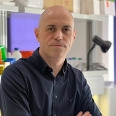
Antonios Chatzigeorgiou
National Kapodistrian University of Athens
University of Massachusetts, Worcester
Biomedical Sciences

Athanasia Printza
Aristotle University of Thessaloniki
Stony Brook University, New York
Medicine, Medical education, Health decision-making
Athanasia Printza is a Professor of Otorhinolaryngology-Phoniatrics at the School of Medicine, Aristotle University of Thessaloniki (AUTh), Member of The European Academy of Sciences and Arts and Executive Committee member, The Association of Medical Schools in Europe (AMSE). She obtained her Medical Degree (1991), an M.Sc. in Medical Research Technology (2003) and a Ph.D. title from the Medical School AUTh (2004), and an M.Sc. in Speech and Swallowing Research from the Medical School, University of Newcastle upon Tyne, UK 2006. She trained as an otolaryngologist in Greece and England, obtained post-qualification training in England and Germany, and received scholarships of excellence for undergraduate and graduate studies, and Ph.D. and postdoc research. Since 2001, she works at the Otolaryngology Dept, AUTh, and has organized and run the first Voice and Swallowing disorders clinic in Greece. She is engaged in extensive interdisciplinary and integrated teaching and research, and has supervised many Ph.D. and Master’s Theses. She teaches Otolaryngology, Communication disorders, Medical Education, and Research Methodology. She is a Member of the Organizing Board of the inter-University M.Sc. in Sciences of communication disorders. She has conducted interdisciplinary research in outcome measures, patient-centered health care, shared decision-making, swallowing, voice, olfaction, and medical education. Professor Printza has published more than 90 full papers in peer-reviewed journals, many book chapters, and has delivered more than 200 conference lectures. She has been engaged in continuing professional development in educational methodology and bioethics (SNFBioethics Academy Alumni). As a member of the Committee of Ph.D. studies and a research projects evaluator, she fosters postgraduate education and quality assurance of research at the School of Medicine. She has organized Upper Respiratory tract Endoscopy, Stroboscopy, Phoniatrics, Swallowing Disorders, and ENT Emergencies seminars and initiated the AMSE2024 conference Advancing patient-centricity in medical education, research and healthcare” at the School of Medicine in collaboration with the OxCME. She is a member of the panel of experts at the Oxford Centre of Medical Education, The DO'L Medical Educator Award, President of the Hellenic Society of Phoniatrics and Swallowing disorders, Deputy President of the School of Medicine Committee of International Relations, country representative at the European Dysphagia Council, member of many scientific societies, and an Honorary Member of the Romanian ENT society. She has received awards of excellence for International Teaching, and International Recognition and Impact from the Faculty of Health Sciences, the Thessaloniki Ambassador Award from the TCB, and awards from the Romanian ENT Society.
As a 2025-2026 Fulbright Scholar, Athanasia will be hosted at Stony Brook University to engage in the development and evaluation of learning experiences and educational activities to foster shared health decision- making and patient-centered care. This is in line with her engagement as an academic, clinician and educator, in fostering innovation, student and patient agency in learning and healthcare and enhancing societal accountability of medical education. As a scholar visiting Stony Brook University, which is actively engaged in transforming health professionals’ education to meet community health care needs, she will be able to exchange experiences and develop transferable skills that can shape her home health education and healthcare ecosystems to promote patient agency and empower health professionals to proactively care for their wellbeing and show social responsibility.
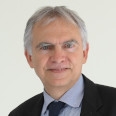
Dimitrios Anglos
University of Crete, Heraklion
Foundation for Research and Technology-Hellas
University of Massachusetts, Lowell
Analytical Chemistry
Demetrios Anglos is a Professor at the Department of Chemistry, University of Crete (UoC) and Associated Researcher at the Institute of Electronic Structure and Laser, Foundation for Research and Technology-Hellas (IESL-FORTH), where he leads the Applied Spectroscopy Laboratory (since 2001). He holds a B.Sc. in Chemistry (1986) from the University of Athens, Greece and a Ph.D. in Physical Chemistry (1994) from Cornell University, U.S.A. The activities of his research group focus on a) the study of photophysics in molecules and novel nanomaterials with potential sensing applications, for example, ZnO/polymer hybrids or carbon nanomaterials and b) the applications of laser spectroscopic techniques (LIF, LIBS, Raman spectroscopy) in the analysis of materials, with particular emphasis on the development of mobile, field-deployable instrumentation. In this context, the Applied Spectroscopy Lab at IESL-FORTH has developed novel instruments, based on the LIBS technique, specially designed for studying archaeological objects and works of art on site and adapted a mobile micro-Raman system likewise for supporting analytical campaigns in museums and archaeological sites. In 2022, the lab completed the construction of a micro-LIBS spectrometer, which has been installed at the Leibnitz Institute of Archaeology (Mainz, Germany) and is currently used in the context of palaeoenvironment studies, more specifically, elemental imaging of marine shell cross-sections. The output of his research is presented in over 100 publications (4 invited) in peer-reviewed journals and in several talks (25 invited) at major international conferences. In 2014, he was a speaker in the Onassis Lectures organized at several East Coast Universities (Yale, Columbia, UPenn, SUNY Stonybrook, Boston Univ.) on the use of laser technologies for the conservation of the Parthenon Marbles in the Athens Acropolis. He has been involved in a number of EU and nationally funded research projects while he has also co-ordinated a multi-site Marie-Curie Early Stage Training project (Advanced Training in Laser Sciences; 2004-2008) and a Marie Curie Intra-European Post-Doctoral Fellowship Grant (2016 – 2018). During the period 2001-2016 he served as the Technical Manager of the IESL FORTH Ultraviolet Laser Facility, currently a member of LASERLAB-EUROPa a network linking 30 major European laser infrastructures. He has over the past few years concentrated his efforts on European and National Initiatives which aim at developing Research Infrastructures relevant to Cultural Heritage Science, E-RIHS (European Research Infrastructures for Heritage Science) and E-RIHS.gr. He is teaching Physical Chemistry (Molecular Spectroscopy) at the Chemistry Department, UoC, an advanced laboratory course on modern laser-based research for Chemistry majors, and a graduate course on Laser Spectroscopy. He has supervised several undergraduate and graduate research thesis projects (30 diploma, 20 M.Sc., 8 Ph.D.), while he has been on the evaluation boards of Ph.D. theses in several European Universities. Since 2012, he has been a member of the Editorial Board of Heritage Science. In the period of 09.2022 – 07.2024, he served as the Head of the Department of Chemistry, UoC. He has also been actively involved in several Department committees including the undergraduate and graduate curriculum, safety, department internal evaluation committees, and coordinated the University committee that supported successfully the excellence award of the EU concerning the Human Resources Strategy for Researchers at the UoC. He has served, for over 6 years as an elected member of the IESL-FORTH scientific council.
In the context of 2025 – 2026 Fulbright scholarship, Demetrios will be hosted at the University of Massachusetts Lowell (UML), Kennedy College of Sciences, and will carry out his research in the laboratory of Prof. Noureddine Meliketchi at the Department of Physics and Applied Physics. The focus of this research endeavor is two-fold. First to optimize portable instrumentation, based on Laser-induced breakdown spectroscopy (LIBS), for carrying out analysis of biological samples and second to integrate machine-learning methods for spectrochemical data analysis as tools for achieving disease diagnostics. This collaboration offers the ground for extensive knowledge and expertise sharing by the UoC and UML groups with the goal of contributing with laser-based spectrochemical techniques combined with advanced machine learning tools towards the development of efficient diagnostic methodologies.
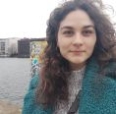
Eirini Zacharoula Tsiodra
National Observatory of Athens
Rutgers, The State University of New Jersey, Piscataway
Environmental Toxicology
Ιrini Tsiodra is a postdoctoral researcher with expertise in experimental atmospheric chemistry, particularly in the measurement, analysis, and exposure assessment of highly toxic organic pollutants. She earned her B.Sc. in Chemistry in 2015, followed by an M.Sc. in Environmental Sciences and Engineering in 2017, and a Ph.D. in Environmental Chemistry in 2023, all from the University of Crete's Department of Chemistry. Her doctoral research focused on the variability, sources, and health effects of carcinogenic polycyclic aromatic hydrocarbons (PAHs) and their atmospheric derivatives, emphasizing the increased emissions from residential biomass burning linked to the economic recession. With over a decade of experience in analytical research and development, Irini specializes in gas chromatography-mass spectrometry (GC-MS). She has been affiliated with the Environmental and Chemical Processes Laboratory (ECPL) since 2014, and was a member of the Center of Studies on Air Quality and Climate Change (C-STACC) at FORTH/ICE-HT from 2017 to 2023. In 2023, she joined the Institute for Environmental Research & Sustainable Development of the National Observatory of Athens (NOA-IERSD) as a research fellow.
Through the Fulbright Scholarship Program for Visiting Scholars, Irini will have the opportunity to develop her prospects at the early stages of her career. The Fulbright scholarship will support her in continuing research in the highly motivating environment of Rutgers University under the supervision of Prof. Philip Demokritou. She will strengthen her expertise in analytical method development, transferring and testing her experience in environmental organic chemistry. Furthermore, she will polish her abilities in new techniques related to Micro-nano plastic pollution, and she will acquire scientific independence and the capacity to manage a research project.
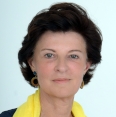
Electra Gizeli
University of Crete, Heraklion
Foundation for Research and Technology-Hellas
Harvard Medical School, Boston, Massachusetts
Biological & Biomedical Sciences
Dr. Electra Gizeli is a Professor in the Department of Biology at the University of Crete and Affiliated Researcher & Deputy Director at IMBB-FORTH. She studied in Greece (B.Sc. in Chemistry, National and Kapodistrian University of Athens) and the UK (M.Sc. at University College London and Ph.D. at the University of Cambridge). After receiving a competitive 5-year BBSRC Fellowship, she established her group at the Institute of Biotechnology, University of Cambridge, until 2003 when she joined the University of Crete as a faculty member. In Greece, she was one of the first to establish a highly multidisciplinary lab covering both basic and applied research. Her scientific interests include biosensor/biophysics, molecular diagnostics, nanobiotechnology and biomedical engineering; she has published >90 scientific articles and has 6 patents. The transfer of innovative concepts from the lab to the society has been a constant inspiration in her group, with emphasis on molecular diagnostic tools for healthcare applications. She has co-organized several validation studies in hospitals in Europe and Africa, applying novel methods to infectious diseases-testing. Her group has received 4 Innovation awards including the Nokia Open Innovation Challenge in Finland in 2015. She is the co-founder of two spin-off companies of FORTH, dedicated to diagnostic platforms at the point-of-care. During her research career, she has coordinated 33 multidisciplinary research projects after securing competitive funding, most notably from the HFSP and EU, raising in total 32M€ (10M€ for her group). Until today, in her lab she has trained 25 post-docs, 15 Ph.D., and >70 M.Sc. and undergraduate students. She has established and leads the IMBB Mentoring Scheme to assist young researchers towards their future careers. She is particularly active in the dissemination of science to the wide audience through participation in open science events. As a recognition to her contribution to science and training, Prof. Gizeli has been elected Fellow of the Royal Society of Chemistry (FRSC) (2016), member of the European Molecular Biology Organization (EMBO) (2023) and member of the Academia Europaea (2024).
During her Fulbright Scholarship, she will spend four months at the Department of Systems Biology at Harvard Medical School, hosted by Prof. Michael Springer. Together with Prof. Springer’s group, she will conduct research on the development of a pipeline for the rapid and efficient production of diagnostic tools at the point-of-care. The work will focus on improving sample collection and transport methods, developing a novel in silico tool for the design of an isothermal molecular assay and, finally, lab-optimization and validation of the assay in a relevant clinical environment. Prof. Gizeli will also participate in the diagnostic accelerator at the Wyss Institute, exploring translational-research opportunities on pandemic preparedness and the development of cost-effective, high throughput point-of-care diagnostics. Her exposure to a simulating and diverse ecosystem of academics, clinicians and technology transfer officers working on diagnostics will serve as a rich environment for her sabbatical, leading potentially to new scientific and technological solutions and strengthening innovation and funding prospects between the University of Crete and Harvard Medical School.

Eleni Aretoulaki
National Technical University of Athens
DePaul University, Chicago, Illinois
Industrial Management/Supply Chain Management
Dr. Eleni Aretoulaki is a Post-Doctoral Researcher at the Operational Research & Logistics Laboratory (ORLOG) at the National Technical University of Athens (NTUA), Greece. She holds a Ph.D. in Supply Chain Management and Logistics and a Diploma in Mechanical Engineering, both from NTUA. Her doctoral research, funded by the Hellenic Foundation for Research and Innovation (HFRI), focused on the integration of drones and information and communication technologies in humanitarian logistics. She examined how these technologies can be combined to enhance coordination and effectiveness in disaster response and recovery operations. Her dissertation detailed both the functional and non-functional requirements for a platform enabling such integration, and proposed a system architecture to facilitate more efficient field deployment. The research was further validated through structured engagement with industry professionals and stakeholders. Dr. Aretoulaki’s research interests lie at the intersection of humanitarian logistics, warehouse operations, and the practical application of advanced technologies across supply chains. She has participated in projects focused on minimizing material losses, improving accuracy in logistics execution, and enhancing resource allocation using digital tools such as simulation models, digital twins, and process mapping. To date, she has contributed to eight research projects funded by national and European programs—two as a postdoctoral researcher and six during her doctoral studies. She is the author of 12 peer-reviewed journal articles and more than 20 conference papers and has received three reciprocal research scholarships and three Thomaidio Awards in recognition of her academic contributions. Dr. Aretoulaki has also been active in teaching, delivering lectures to both undergraduate and postgraduate students at NTUA. In parallel, she has served as an instructor in NTUA’s Professional Development Program in Logistics 4.0 and has been an invited lecturer at the Board of European Students of Technology (BEST) Athens Seminar, where she taught logistics methods and systems. Her professional experience extends to applied research and consultancy in logistics network optimization, process modeling, and material flow analysis across office, retail, and industrial environments.
As a 2025–2026 Fulbright Visiting Scholar at DePaul University, Dr. Aretoulaki will contribute to the development of an early-stage optimization model for decision-making in humanitarian logistics. Her work will include a techno-economic assessment of unmanned systems and communication technologies, the design of initial process models for their deployment, and the collection of field-relevant data from U.S.-based operations to inform the model’s development. Upon her return to NTUA, Dr. Aretoulaki intends to integrate the insights gained through her Fulbright experience into both academic curricula and executive education initiatives. In parallel, she will actively contribute to the advancement of applied research in this field within Greece, where structured, data-driven approaches to humanitarian logistics remain both timely and critically needed.
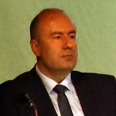
Panagiotis Iliopoulos
University of Ioannina
Binghamton University-SUNY, New York State
Political Philosophy
Panagiotis Iliopoulos is a Ph.D. in Philosophy and postdoctoral researcher at the Universities of Madrid and Crete. He teaches at the University of Ioannina, and is an elected member of its Senate. He has also taught at the Universities of Athens, Thessaloniki and the Peloponnese in Greece, as well as at the universities of New York, Bogazici, and Eastern Connecticut. He has received the Orlyk Award from the National Dragomanov University of Kiev, and the P. Oikonomou Award of the Class of Moral and Political Sciences from the Academy of Athens. In 2021 he was a candidate for the Prize of Excellent Teaching at the Open University of Cyprus. His main research interests are: Ancient Greek and Roman Philosophy, History of Philosophy, Moral and Political Philosophy. He has lectured widely in Greek and foreign universities, and he has presented scientific papers in various philosophical conferences all over the world. His articles and reviews have been published in several Greek and foreign philosophy journals, or have been included in international collective volumes. Several of them have been translated to several languages other than Greek or English. Dr. Iliopoulos has served as the Vice President of ISUD (International Society for Universal Dialogue) and also as the Vice President in the Scientific Council of the Academy of Institutions and Cultures, among other organizations where he has participated in the respective Boards of Directors. Regarding publications, he has authored five monographs and more than ninety articles. Recently he co-edited a collective volume on Nationalism in Routledge, London.
During his Fulbright Scholarship, he will spend four months at the State University of New York (Binghamton) and Cornell University. He will work with Professor Anthony Preus who published a translation of Pierre Pellegrin's book on Aristotle's Politics at SUNY Press, but also with Lisa Tessman who is serving as Vice President/President Elect of the Eastern Division of the American Philosophical Association, and others. In his research project, Dr Iliopoulos starts with the observation that in Hellenistic philosophy, the issue of identity becomes gradually very important. Several other subsequent issues, connected with political inclusivity, arise and often conclude to philosophical ideas about the formation of political societies with a view to analysing how political duties are to be understood. In the present study, he will substantiate that the Hellenistic philosophers are aware of the difficulties of this transition from one to many, from the individual to the whole, and that Stoicism reinforces the emphasis on the practical aspect of the phenomenon of appropriation, proposing beneficial actions, and thus maintains political life. While this may be the beginning of another political utopia in the history of philosophy, with his research he aims to reject this possibility and to explore a) how the concept of the identity of the individual in Hellenistic theories prevents political conceptions from being converted into idealistic schemes, and b) how law and ideology are neither the unique possible constituents of political life nor the main references in a political life of inclusivity. Further, part of the research will be a comparative analysis in accordance with selected political theories of the 20th century that will shed more light on this discussion. Professor Charles A. Goodman who is the Director of the Program in Philosophy, Politics and Law, will be a valuable collaborator for the project of Dr Iliopoulos about Seneca’s ideas on politics and on the influences of the law. Of particular importance will be the collaboration with Professor Maxim A. Pensky, whose field is also political philosophy, and who is the co-director of the Institute of Genocide and Mass Atrocity Prevention. Furthermore, Dr Iliopoulos will cooperate with Professor Mateo Duque on an edition about political philosophy in antiquity regarding the issue of identity.

Patrina Paraskevopoulou
National and Kapodistrian University of Athens
The University of Memphis, Tennessee
Biomedical Applications
Patrina Paraskevopoulou is a Professor in Chemistry at the Chemistry Department of the National and Kapodistrian University of Athens (NKUA). She earned her B.Sc. in Chemistry, M.Sc. in Inorganic Chemistry and Technology and Ph.D. in Chemistry from NKUA. She was a postdoctoral fellow at NKUA and at the Missouri University of Science and Technology (MS&T), U.S.A. In 2016, she was awarded a fellowship from the German Academic Exchange Service (DAAD Research Stays for University Academics and Scientists) and conducted research at the Hamburg University of Technology in Germany. She has over 20 years of experience in synthetic chemistry, catalysis, and electrochemistry. Since 2015 she has been working with inorganic and hybrid organic/inorganic nanostructured materials, such as metal-doped synthetic polymer, biopolymer and carbon aerogels, including novel polyurea-crosslinked biopolymer aerogels, and their use in environmental, food, and biomedical applications. In the last 15 years, she has been the PI or co-PI in several National and European Projects, and she served in the Core Management Committee of the COST Action AERoGELs, and as Working Group Leader in COST Innovation Grant ECO-AERoGELs. In 2023, she was recognized as a CAS REGISTRY Innovator by the American Chemical Society, and she also co-supervised the team of graduate and undergraduate students that won the 3rd prize in Ecotrophelia Greece 2023 for AiryBerry, an innovative aerogel-based food product. In 2025, she was a member of the team that won the 1st prize at the Hackathon Türkiye-Greece 2025. She has served as an expert evaluator for proposals in Marie-Curie and several national calls. She has served as Guest Editor in Polymers and Frontiers in Chemistry. She serves as a reviewer for more than 30 scientific journals. She has participated in the organizing and scientific committees of several national and international conferences. In 2022, she organized in Athens the 2nd International Conference on Aerogels for Biomedical and Environmental Applications.
As a 2025-2026 Fulbright Scholar, Prof. Paraskevopoulou will be hosted at the Department of Physics and Materials Science, The University of Memphis, TN. She will be studying biomedical applications of polyurea-crosslinked biopolymer (X-biopolymer) aerogels. X-biopolymer aerogels is a new class of materials introduced by Prof. Paraskevopoulou’s group in 2020. These nanostructured/nanoporous materials retain all desirable properties of their parent biopolymer aerogels (biocompatibility, biodegradability, low density, high surface area), while they are mechanically strong. Certain aliphatic X-biopolymer aerogels can degrade ex vivo within reasonable timeframes, and therefore they can be used as tissue regeneration scaffolds. Degradation rates can be tuned, via modification of the synthetic parameters. The overall objective of this project is to design and synthesize X-biopolymer aerogels with controllable degradation rates, aiming at advancing their potential for use in tissue engineering and regenerative medicine.
